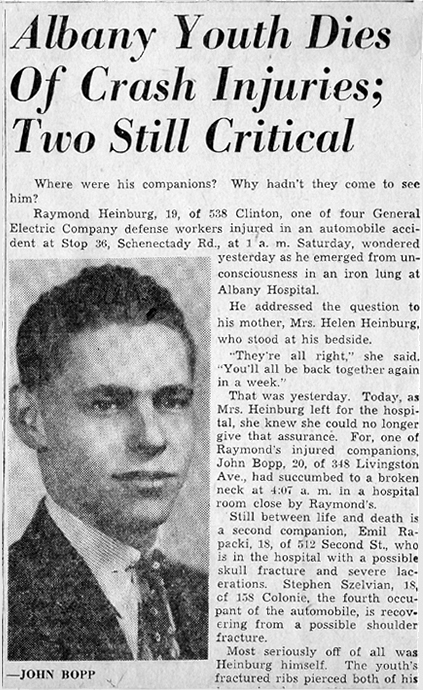Celebrating the brief life
of John Charles Bopp
75 years after his death
Special Guest Chapter
by
Audrey Bopp Hauprich
(PDF
expanded version)
 For decades, John Charles Bopp -- the first-born son of Valentine and Catherine
Bopp -- was little more to their grandchildren than a handsome face inside of
picture frame. But the young man known simply as “Uncle John” had lived life to
the fullest and brought untold sunshine into the lives of loved ones until a
tragic accident led to his untimely passing in 1941. John’s youngest sister,
Audrey Bopp Hauprich, recently recorded her memories of a brother who remains as
dear to her heart today as when they last broke bread together on Livingston
Avenue in Albany just over 75 years ago. What follows is an excerpt from her
poignant essay -- which is a heartfelt tribute to a life well lived.
For decades, John Charles Bopp -- the first-born son of Valentine and Catherine
Bopp -- was little more to their grandchildren than a handsome face inside of
picture frame. But the young man known simply as “Uncle John” had lived life to
the fullest and brought untold sunshine into the lives of loved ones until a
tragic accident led to his untimely passing in 1941. John’s youngest sister,
Audrey Bopp Hauprich, recently recorded her memories of a brother who remains as
dear to her heart today as when they last broke bread together on Livingston
Avenue in Albany just over 75 years ago. What follows is an excerpt from her
poignant essay -- which is a heartfelt tribute to a life well lived.Following the birth of his three elder sisters (two of whom died in infancy), the first son born to Valentine and Catherine Bopp entered the world on Friday, October 8, 1920. In family tradition he was baptized John Charles in honor of his maternal and paternal grandparents.
Although John apparently had difficulties in school, he used to joke that “I’m so bright they call me Sunny.” I cannot remember the early years, but I do remember that at one time he had his head shaved. The “haircut” was called a “baldy sour.”
 In the ninth grade John was in the Philip Livingston Junior High School musical
production where he was one of the three conspirators together with Charlie
Murtha and another fellow. Bob Havens was Montmorency, monarch of Eurolania. It
was about that time that John also befriended George Irish. All three of these
boys became frequent visitors to our home.
In the ninth grade John was in the Philip Livingston Junior High School musical
production where he was one of the three conspirators together with Charlie
Murtha and another fellow. Bob Havens was Montmorency, monarch of Eurolania. It
was about that time that John also befriended George Irish. All three of these
boys became frequent visitors to our home.On the first day of hunting season when John was in the ninth grade, Mother saw that he could be excused from school so that he could go into the woods to stalk his prey. By that time he had saved enough money (from the paper route that he shared with older sister Caroline) to own a Remington “over-under” rifle.

In Albany High School he sang in the choir under the direction of Frank B. Bailey. Mr. Bailey told Mom that only one in a hundred had perfect pitch and John was number two of that hundred. He sang so well that he was chosen to sing in a double quartet where he was one of the baritones; all singing was a cappella. I remember so well the old plantation spiritual Deep River, the song of the Volga Boatmen and another Russian song Hospodepomui.
In junior high John had taken print shop and metal shop. When he reached Grade 9, he took high school shop courses where he became an excellent cabinet maker. A small butterfly-drop leaf table made by John remains a cherished family heirloom in the home of one of my brothers, while I have a wooden footstool and a corner curio shelf which John also fashioned.
We had assembly programs in high school where Principal Dr. Harry Pratt would sometimes quiz the students. John (whom Mom said was “not afraid of God, man or the devil”) stood up and answered the question of who was paving Western Avenue which the school faced. His answer was the W.P.A. He was right. He also answered a question regarding which lights were better to illuminate streets: incandescent or sodium vapor. Again he gave the right answer: sodium vapor.
I can remember two jobs that John had while attending high school. Once he was a messenger boy for Western Union. He was most impressed by the fact that one of his deliveries was to the home of Mrs. Anthony Brady Farrell -- a millionaire on Western Avenue. He also set up pins in Rice’s Bowling Alley on Western Avenue near Quail Street. If John worked late at night he would stop at Brooks Donut Shop on Northern Boulevard where he would bring home a dozen crème filled donuts which we could sample the following morning.
 Abandoning his earlier means of transportation, a bicycle, John moved up a notch
after he graduated from high school and entered “defense industry” assembly line
work at General Electric in Schenectady. His vehicle then was a Model A Ford
roadster with a rumble seat.
Abandoning his earlier means of transportation, a bicycle, John moved up a notch
after he graduated from high school and entered “defense industry” assembly line
work at General Electric in Schenectady. His vehicle then was a Model A Ford
roadster with a rumble seat.On Friday, August 15, 1941 this car needed repairs, and John carpooled with some friend going to work on the 4 p.m. to midnight shift. At one o’clock Saturday morning, the driver of that car in a teeming rain storm collided into an unlit parked tractor trailer on Central Avenue Route 5. John was thrown from the rear seat of the two-door club coupe onto the highway pavement and suffered a broken neck (the third vertebra) and was paralyzed from the waist down.
 Four days later, Mom -- who could not bear to see John suffer any longer from
this and other injuries -- asked Dad to stop praying for him to live. John
succumbed.
Four days later, Mom -- who could not bear to see John suffer any longer from
this and other injuries -- asked Dad to stop praying for him to live. John
succumbed.The long green canoe which he co-owned with a friend remained suspended in the garage adjacent at 348 Livingston Avenue. John was buried from home at a solemn requiem high mass in Our Lady of Angels Church and interred in that cemetery. Later the Rollatorium Rollers commemorated his memory in their skating rink on Western Turnpike.
Mother could no longer stay in a house filled with memories, and we soon moved to 193 Hollywood Avenue. Dad’s hair turned gray within a year, and he became a daily communicant at St. Teresa’s Church next door to the fire house on New Scotland Avenue. This was a difficult time in our lives.
